
POLYMER-KOREA
Scope & Guideline
Unveiling Breakthroughs in Polymer Science Since 1996
Introduction
Aims and Scopes
- Polymer Synthesis and Characterization:
Research on the synthesis of new polymer materials, including biopolymers and composites, along with their characterization using various techniques to understand their physical and chemical properties. - Functional Polymer Applications:
Studies exploring the applications of polymers in diverse fields such as biomedical engineering, food packaging, and electronics, emphasizing the functional properties of these materials. - Polymer Blends and Composites:
Investigation into the blending of different polymers and the incorporation of various fillers to enhance mechanical, thermal, and electrical properties, focusing on eco-friendly and biodegradable options. - Nanostructured and Smart Polymers:
Research on the development of nanostructured polymer materials and smart polymers that respond to environmental stimuli, with applications in drug delivery, sensors, and energy storage. - Polymer Processing Techniques:
Exploration of various processing methods such as extrusion, injection molding, and 3D printing to optimize the manufacturing and performance of polymer products.
Trending and Emerging
- Sustainable and Biodegradable Polymers:
An increasing emphasis on the development of sustainable materials, including biodegradable and bio-based polymers, in response to environmental concerns and plastic waste management. - Smart and Responsive Polymers:
Research into polymers that can respond to external stimuli, such as temperature and pH, is gaining traction, particularly for applications in drug delivery systems and smart materials. - Nanotechnology in Polymer Science:
The use of nanomaterials to enhance the properties of polymers is a growing focus, leading to advancements in fields like electronics, energy storage, and biomedical applications. - 3D Printing and Additive Manufacturing:
There is a rising trend in research on polymer materials specifically designed for 3D printing, highlighting innovations in material formulations and processing techniques. - Interdisciplinary Applications:
An increase in interdisciplinary research that combines polymer science with fields such as medicine, electronics, and environmental science, reflecting the versatility and importance of polymers in modern technology.
Declining or Waning
- Traditional Polymerization Techniques:
There has been a noticeable decrease in publications focusing solely on traditional polymerization methods, as researchers are increasingly exploring more advanced techniques such as controlled/living polymerization. - Conventional Thermoplastic Applications:
Research on conventional applications of thermoplastics in industries such as packaging is waning, possibly due to the rising interest in sustainable and biodegradable materials. - Basic Polymer Physics:
Studies concentrating on the fundamental principles of polymer physics are less frequently published, overshadowed by applied research that emphasizes practical applications and innovations.
Similar Journals
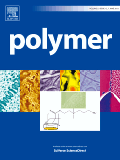
POLYMER
Connecting Scholars through Cutting-edge Polymer SciencePOLYMER, an esteemed journal published by Elsevier Science Ltd, stands at the forefront of polymer science, presenting cutting-edge research that encompasses the realms of Materials Chemistry, Organic Chemistry, and Polymers and Plastics. With a remarkable impact factor reflecting its significance in the academic community, POLYMER has been a vital resource since its inception in 1960, contributing to a converged body of knowledge through to 2024. Rated Q1 in all relevant categories as of 2023, and boasting impressive Scopus rankings, this journal not only facilitates advanced discussions in polymer synthesis, characterization, and applications but also serves as a critical platform for collaborative research among scholars, professionals, and students. While it offers content primarily via subscription, POLYMER remains dedicated to fostering innovation and excellence in the field, making it an essential read for anyone passionate about polymer science.
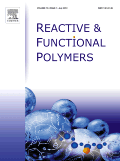
REACTIVE & FUNCTIONAL POLYMERS
Exploring the Frontiers of Reactive and Functional PolymersREACTIVE & FUNCTIONAL POLYMERS, published by Elsevier, is a leading journal in the field of polymer science, focusing on the innovative development and application of reactive and functional polymers. With an impressive impact demonstrated through its classification in various prestigious categories, including Q1 rankings in Chemical Engineering, Chemistry, and Materials Chemistry, this journal serves as an essential resource for researchers and professionals seeking to explore the latest advances in polymer research. With a broad scope that encompasses topics from biochemistry to environmental chemistry, and a convergence of significant findings from 1995 to 2024, REACTIVE & FUNCTIONAL POLYMERS fosters academic dialogue and collaboration among scientists. The journal also features Open Access options, ensuring that groundbreaking research is readily available to a global audience. By consistently publishing high-quality articles, it not only enriches the scientific community but also drives innovation across various industries reliant on polymer technologies.
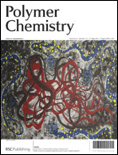
Polymer Chemistry
Unveiling the Science Behind Polymer ApplicationsPolymer Chemistry is a premier peer-reviewed journal published by the Royal Society of Chemistry, focusing on cutting-edge research and developments in the field of polymer science. With its ISSN 1759-9954 and E-ISSN 1759-9962, this journal has established a significant impact within the academic community, as evidenced by its impressive Q1 ranking in areas such as Biomedical Engineering, Organic Chemistry, and Polymers and Plastics. Over its convergence period from 2010 to 2024, Polymer Chemistry has become an essential resource for researchers, professionals, and students, showcasing innovative studies that advance the understanding of polymer behavior and applications. The journal does not currently offer open access, allowing for a traditional but rigorous peer-review process ensuring high-quality publications. For those engaged in the rapidly evolving disciplines of biochemistry and bioengineering, Polymer Chemistry serves as a vital platform for disseminating influential findings and fostering interdisciplinary collaboration in a global context.
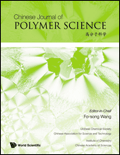
CHINESE JOURNAL OF POLYMER SCIENCE
Transforming Ideas into Polymer InnovationsThe CHINESE JOURNAL OF POLYMER SCIENCE, published by SPRINGER, stands as a premier periodical in the realm of polymer science, showcasing cutting-edge research and technological advancements since its inception in 1985. With an impressive impact factor reflecting its significance in the field, this journal is categorized in the top quartiles (Q1) of Chemical Engineering, Organic Chemistry, and Polymers and Plastics. It features a wide spectrum of innovative studies, thus serving as an essential resource for researchers, professionals, and students dedicated to understanding and advancing polymer-related technologies. The journal is indexed in Scopus, with notable rankings that highlight its influence in the disciplines of organic chemistry and materials science, making it a vital communication platform for authors around the globe aiming to disseminate impactful findings. Although not an open-access publication, the journal ensures robust accessibility through institutional subscriptions and partnerships, further emphasizing its commitment to the advancement of polymer science.

INTERNATIONAL POLYMER PROCESSING
Exploring Innovations in Polymer Processing TechnologiesINTERNATIONAL POLYMER PROCESSING, published by WALTER DE GRUYTER GMBH, serves as a crucial platform for professionals and researchers in the fields of Chemical Engineering, Industrial and Manufacturing Engineering, and Materials Science, particularly focusing on polymers and plastics. With its ISSN 0930-777X and E-ISSN 2195-8602, this journal has been in circulation since 1988 and continues to expand its contributions to contemporary research trends through to 2024. Ranking in the third quartile across multiple categories, including Chemical Engineering (miscellaneous) and Materials Chemistry, it offers insightful and rigorous peer-reviewed articles that enhance the understanding of polymer processing technologies and innovations. This journal is vital for anyone engaged in polymer science and engineering, providing both theoretical and practical perspectives that advance the field. Although it does not provide open access, the journal's content is indispensable for academia and industry professionals looking to stay at the forefront of polymer research.
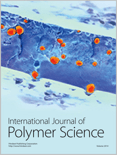
International Journal of Polymer Science
Innovating the Future of Polymer ScienceInternational Journal of Polymer Science is a prominent and peer-reviewed journal dedicated to advancing the field of polymer science. Published by Hindawi Ltd, this open-access journal has been making significant contributions to the discipline since its inception in 2009, ensuring that research findings are accessible to a global audience. With an impressive impact factor and positioned in the Q2 quartile for Polymers and Plastics as of 2023, it ranks 46th out of 161 in the Scopus database, reflecting its strong standing in the research community. The journal welcomes innovative research across various topics within polymer science, including synthesis, characterization, and applications in diverse industries. By providing a platform for scholars, professionals, and students, the International Journal of Polymer Science not only encourages the dissemination of knowledge but also fosters collaboration and innovation in this essential field. Based in Egypt and operating under a rigorous selection process, it remains a vital resource for anyone involved in polymer research.
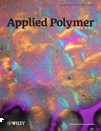
JOURNAL OF APPLIED POLYMER SCIENCE
Advancing the Frontiers of Polymer ResearchThe Journal of Applied Polymer Science, published by Wiley, is a leading journal in the field of polymer science, showcasing innovative research and applications in various domains since its inception in 1959. With an ISSN of 0021-8995 and an E-ISSN of 1097-4628, it is indexed in prominent databases, maintaining a strong presence with Scopus rankings placing it in the Q2 category across multiple disciplines, including Chemistry, Materials Chemistry, and Polymers and Plastics. The journal’s commitment to advancing scientific knowledge is reflected in its impact on the materials science community, with noteworthy rankings such as #38 in Surfaces, Coatings and Films and #51 in Polymers and Plastics. Though not an open-access publication, it remains a vital resource for researchers, professionals, and students aiming to deepen their understanding of polymer applications and to stay abreast of the latest developments in this ever-evolving field. With a focus on high-quality research, the Journal of Applied Polymer Science continues to be a cornerstone for those engaged in polymer research and its myriad applications.
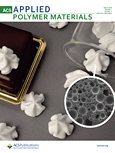
ACS Applied Polymer Materials
Pioneering Insights in Applied Polymer MaterialsACS Applied Polymer Materials is a prestigious journal published by the American Chemical Society, specifically tailored for the dynamic fields of Organic Chemistry, Polymers and Plastics, and Process Chemistry and Technology. With its ISSN 2637-6105, the journal has rapidly established itself within the academic community, achieving a distinguished Q1 quartile ranking across multiple categories in 2023. This places it among the top-tier journals globally, reinforcing its critical role in disseminating groundbreaking research and innovation in polymer science. The journal is known for its rigorous peer-review process and publishes high-quality articles that are pivotal for researchers, professionals, and students eager to advance knowledge in polymer materials and their applications. Positioned to cover converging themes from 2019 through 2024, ACS Applied Polymer Materials embraces a wide scope of studies, from fundamental chemistry to practical engineering applications, thereby fostering significant advancements in material science. While it offers traditional access options, the journal's impact is reflected in its impressive rankings within Scopus, indicating its relevance and influence in the chemical engineering domain. Join the global community of innovators and discover the latest insights that continue to shape the landscape of applied polymer research.

POLYMER SCIENCE SERIES A
Elevating the Standards of Polymer SciencePOLYMER SCIENCE SERIES A is a distinguished journal dedicated to the field of polymer science, with a focus on advancing knowledge in materials chemistry and polymers and plastics. Published by MAIK NAUKA/INTERPERIODICA/SPRINGER, this journal provides a platform for researchers and practitioners to disseminate their findings and innovations. With an ISSN of 0965-545X and an E-ISSN of 1555-6107, it is widely accessible to the academic community. Although currently non-open access, the journal has maintained its significance since its inception in 1991, boasting an evolving emphasis on contemporary issues in polymer science up to 2024. Ranked in the Q3 category for both Materials Chemistry and Polymers and Plastics in 2023, POLYMER SCIENCE SERIES A plays a crucial role in the broader academic landscape, particularly for those committed to understanding and enhancing polymer materials. The journal’s reputation is solidified by its Scopus rankings, where it addresses critical advancements and fosters collaborative research opportunities within the community. We invite researchers, professionals, and students to explore the valuable insights published within these pages.
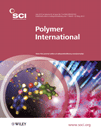
POLYMER INTERNATIONAL
Exploring the Frontiers of Material ChemistryPOLYMER INTERNATIONAL is a leading journal in the field of polymer science, published by Wiley, one of the most esteemed scholarly publishers. With an ISSN of 0959-8103 and an E-ISSN of 1097-0126, this journal has been a pivotal platform for researchers since its inception in 1991, now extending its coverage until 2024. The journal boasts a commendable standing in various scientific domains, achieving a Q2 quartile ranking in Materials Chemistry, Organic Chemistry, and Polymers and Plastics as of 2023. Additionally, it holds impressive Scopus ranks, including Rank #47 in Organic Chemistry and Rank #40 in Polymers and Plastics, placing it within the top percentiles of its categories. Researchers, professionals, and students alike can benefit from its rich array of articles that contribute to the understanding and advancement of polymer technology and materials science. Although not an open access journal, POLYMER INTERNATIONAL remains crucial for disseminating high-quality research that drives innovation and development within the field.